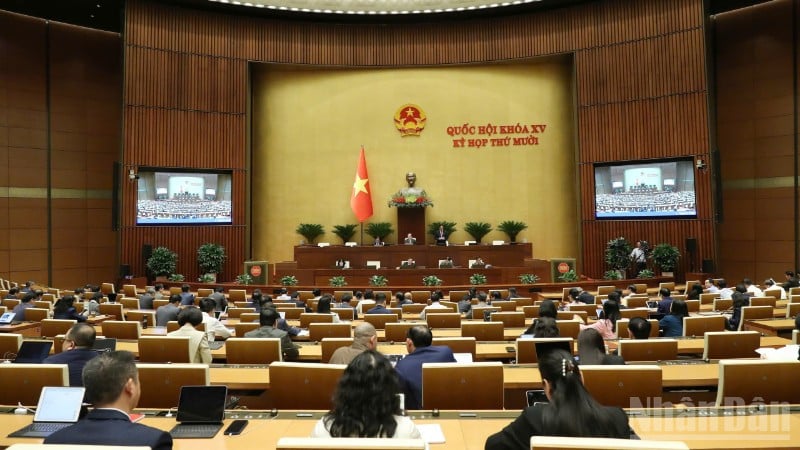
Scene of the National Assembly discussion session, afternoon of November 7, 2025. (Photo: DUY LINH)
Perfecting the draft law in the direction of approaching the Hanoi Convention
On the afternoon of November 7, the National Assembly discussed the draft Law on Cyber Security in the hall. Speaking at the meeting, delegate Thach Phuoc Binh ( Vinh Long ) said that Vietnam hosting the signing ceremony of the United Nations Convention against Cybercrime (Hanoi Convention) is an important milestone, affirming the country's position and capacity for international integration, while demonstrating Vietnam's proactive role in creating a global legal framework for cyber security.
From that reality, delegates recommended perfecting the draft Law on Cyber Security in a direction compatible with international legal standards, ensuring sovereignty and national security in cyberspace, respecting human rights and data privacy.
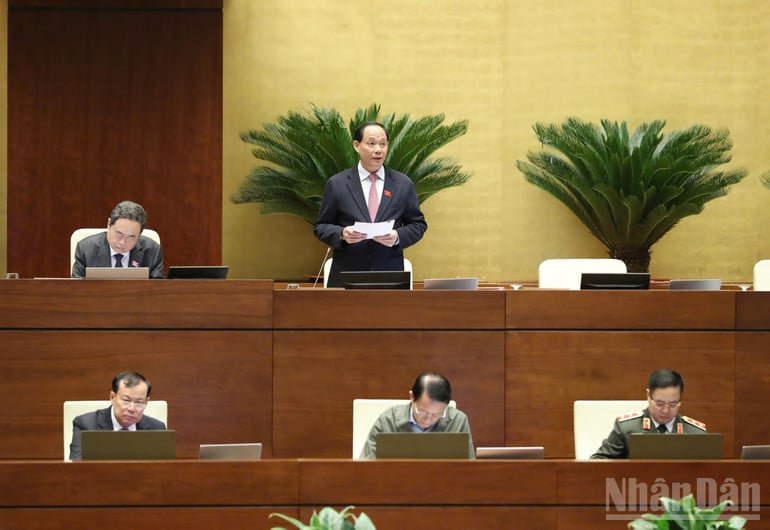
Vice Chairman of the National Assembly Tran Quang Phuong chaired the discussion session. (Photo: DUY LINH)
Specifically, regarding the scope of regulation and concept, delegates said that the current draft Law only focuses on protecting national security, and does not cover the criminalization of cybercrimes as stipulated in the Hanoi Convention 2025. Therefore, it is necessary to add a new chapter on cybercrimes and criminalization of cyber security violations, ensuring consistency with the Penal Code.
Regarding the authority and mechanism of investigation, prosecution and trial, delegates proposed amending Articles 15 and 22 in the direction of adding a common investigation mechanism and electronic judicial assistance; clearly defining the authority of the specialized cybersecurity force when coordinating internationally; allowing the retrieval and confiscation of criminal assets according to international treaties.
Regarding international cooperation and judicial assistance, it is necessary to add a separate chapter, stipulating that the Ministry of Public Security is the national focal point, establishing a 24/7 contact network and a center for coordinating international cooperation on cybercrime; recognizing electronic evidence and digital data provided by foreign countries in accordance with international standards.
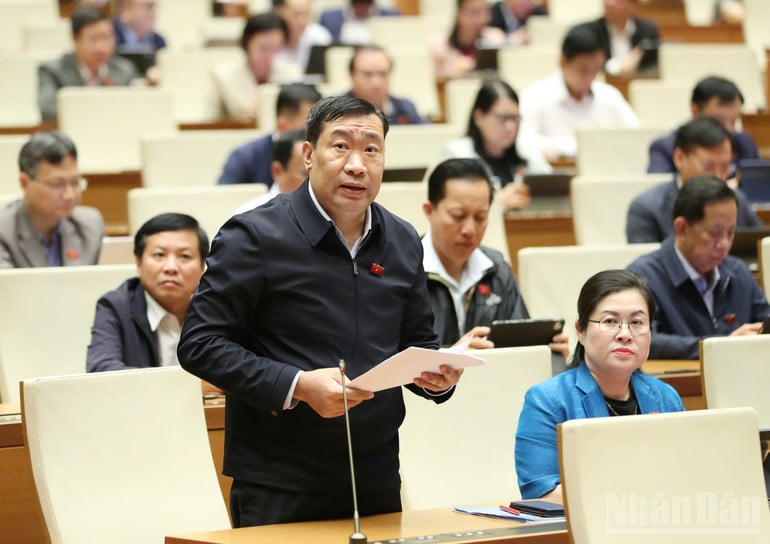
Delegate Thach Phuoc Binh (Vinh Long) speaks. (Photo: DUY LINH)
Delegates also proposed adding a new chapter on cybercrime prevention and human resource development, regulations on corporate responsibility in ensuring digital product safety, a public-private partnership mechanism on sharing cybersecurity information, participating in the United Nations Technical Assistance Fund, and integrating training and technology transfer programs.
At the same time, it is necessary to stipulate a mechanism for monitoring and evaluating implementation: The Government periodically reports to the National Assembly every two years on the national cybersecurity situation, the implementation of international treaties on preventing and combating cybercrime, and the results of international cooperation.
“Reforming the draft Law on Cyber Security in line with the Hanoi Convention 2025 is a necessary step to affirm our country's pioneering role in multilateral legal cooperation of the United Nations, building a safe and transparent digital environment for people and sustainable development,” delegate Thach Phuoc Binh emphasized.
Ensuring unity, creativity and humanity in legal regulation
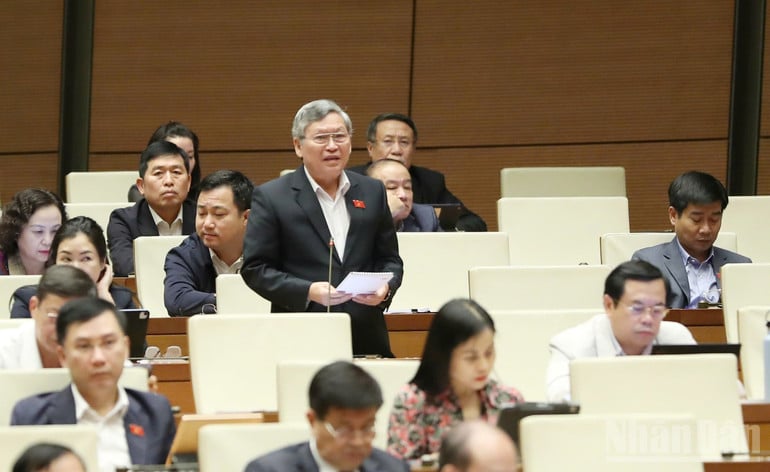
Delegate To Van Tam (Quang Ngai) speaks at the discussion session. (Photo: DUY LINH)
Delegate To Van Tam (Quang Ngai) affirmed that the draft Law on Cyber Security is necessary, consistent with the Party's guidelines and policies, creating a solid legal barrier to protect national security while respecting and protecting the rights of subjects in cyberspace.
Regarding prohibited acts, delegates also pointed out that artificial intelligence (AI) brings great benefits but is being exploited to create distorted, defamatory, and fraudulent content; therefore, it is necessary to add the act of using artificial intelligence to distort and defame others to the group of prohibited acts.
Regarding the prevention and handling of cyber security violations, delegate To Van Tam proposed adding specific regulations on cyber terrorism such as spreading sensitive data, causing chaos, blackmailing or threatening human life and health in cyberspace; at the same time, adding regulations to protect vulnerable groups with physical and mental disabilities.
Delegates also emphasized the importance of the specialized force for cyber security protection, proposed clarifying its functions and tasks, providing in-depth training in technology and equipment, and having reasonable remuneration policies and regimes; at the same time, supplementing mechanisms to mobilize social forces when necessary.
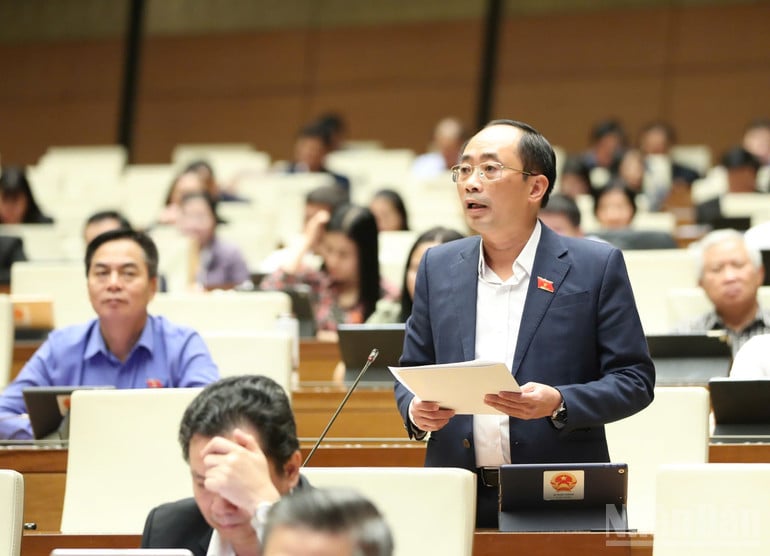
Delegate Le Nhat Thanh (Hanoi) speaks. (Photo: DUY LINH)
Delegate Le Nhat Thanh (Hanoi) highly agreed with the Government's Proposal, emphasizing that the merger of the 2018 Law on Cyber Security and the 2015 Law on Network Information Security is appropriate, timely institutionalizing the Party's viewpoints and meeting practical requirements in the context of extensive digital transformation.
He suggested that the review and completion of the law must adhere to the principle of "one task being chaired and primarily responsible by one agency"; at the same time, clearly defining the authority of the specialized force for cybersecurity protection under the Ministry of Public Security as the leading agency nationwide.
Delegate Le Nhat Thanh also proposed to add regulations on data security, because data is not only personal data but also includes organizational data, systems, infrastructure and user privacy. It is necessary to clarify regulations to ensure data security as an inseparable part of cybersecurity, concretizing Resolution 57-NQ/TW of the Politburo on breakthroughs in science and technology development, innovation and national digital transformation.
In addition, it is necessary to expand the protected subjects to include the elderly, people who have lost or have limited civil capacity; at the same time, supplement regulations to prevent and promptly handle acts of using technology, AI, and deepfake to impersonate, defraud, and insult the honor and dignity of organizations and individuals.
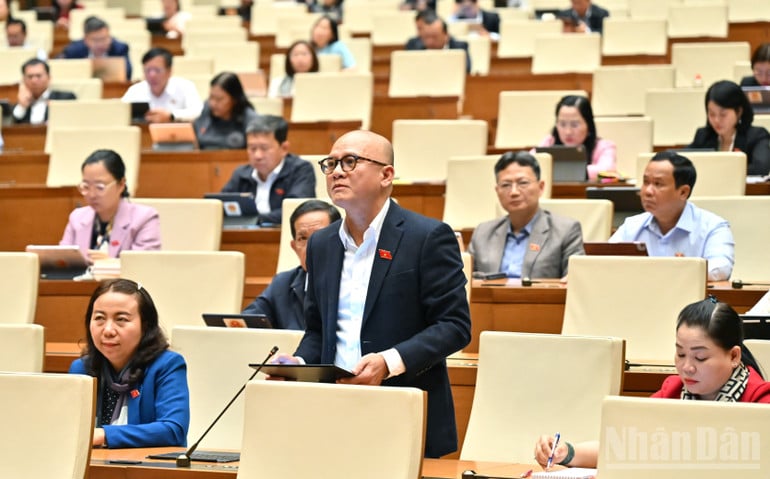
Delegate Be Trung Anh (Vinh Long) speaks at the meeting. (Photo: DUY LINH)
Delegate Be Trung Anh (Vinh Long) emphasized that the Law on Cyber Security needs to aim for a long-term vision, in line with the evolutionary cycle of technology, and at the same time play the role of "infrastructure of trust" in the digital age.
According to the delegate, if the law only focuses on defense and handling violations, it is "just trying to build a higher, thicker wall", while cybersecurity needs to be considered the foundation for digital economic development, creating conditions for innovation and growth.
Delegates proposed adding regulations to protect inferred data - a type of data that can be extracted from public data to prevent processing and authentication of personal identity without the consent of the data subject.
He also proposed allowing the Government to update the risk list and security standards quarterly, ensuring flexibility and avoiding laws becoming quickly outdated in the face of technological fluctuations.
Delegate Be Trung Anh emphasized that this revised law needs to shift its focus from “protecting the present to creating the future”, not just a “shield” but a “runway for the digital nation to take off”. The law must pave the way for innovation, free up resources and unleash the power of national development in the digital age.
TRUNG HUNG
Source: https://nhandan.vn/dai-bieu-quoc-hoi-an-ninh-mang-can-phai-tro-thanh-ha-tang-cua-long-tin-post921479.html










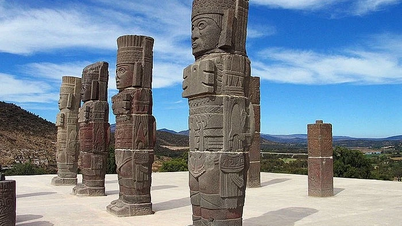



![[INFOGRAPHIC] Portrait of the newly inaugurated President of Cameroon at the age of 92](https://vphoto.vietnam.vn/thumb/402x226/vietnam/resource/IMAGE/2025/11/08/1762560057791_info-tongthong-cameroon-anh-thumb-jpg.webp)







![[Video] Hanoi Oncology Hospital receives Second Class Labor Medal](https://vphoto.vietnam.vn/thumb/402x226/vietnam/resource/IMAGE/2025/11/08/1762561557241_img-2021-9778-png.webp)
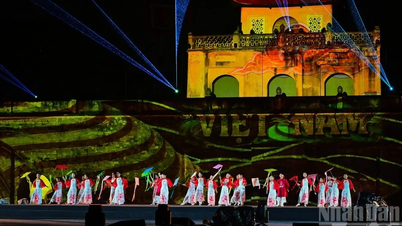



![[Photo] Da Nang: Hundreds of people join hands to clean up a vital tourist route after storm No. 13](https://vphoto.vietnam.vn/thumb/1200x675/vietnam/resource/IMAGE/2025/11/07/1762491638903_image-3-1353-jpg.webp)







































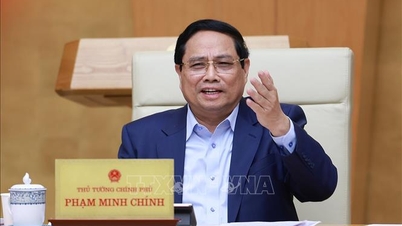

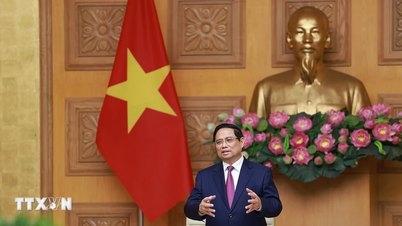


















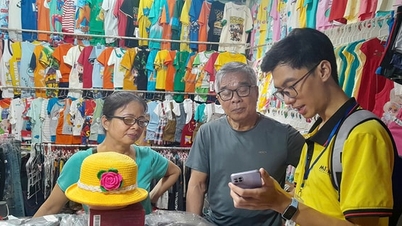



















Comment (0)